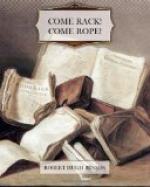He settled himself again in his chair, and began.
* * * * *
“Robin,” he said, “you remember when I spoke to you in the inn on the way to Matstead; it must be seven or eight years gone now? Well, that was when the beginning was. There was no design then, such as we have to-day; but the general purpose was there. I had spoken with man after man; I had been to France, and seen Mr. Morgan there, Queen Mary’s man, and my lord of Glasgow; and all that I spoke with seemed of one mind—except my lord of Glasgow, who did not say much to me on the matter. But all at least were agreed that there would be no peace in England so long as Elizabeth sat on the throne.
“Well: it was after that that I fell in with Ballard, who was over here on some other affair; and I found him a man of the same mind as myself; he was all agog for Mary, and seemed afraid of nothing. Well; nothing was done for a great while. He wrote to me from France; I wrote back to him again, telling him the names of some of my friends. I went to see him in France two or three times; and I saw him here, when you yourself came over with him. But we did not know whom to trust. Neither had we any special design. Her Grace of the Scots went hither and thither under strong guards; and what I had done for her before—”
Robin looked up. He was still quite pale and quite quiet.
“What was that?” he said.
Anthony again made his impatient gesture. He was fiercely excited; but kept himself under tolerable control.
“Why, I have been her agent for a great while back, getting her letters through to her, and such like. But last year, when that damned Sir Amyas Paulet became her gaoler, I could do nothing. Two or three times my messenger was stopped, and the letters taken from him. Well; after that time I could do no more. There her Grace was, back again at Tutbury, and none could get near her. She might no more give alms, even, to the poor; and all her letters must go through Walsingham’s hands. And then God helped us: she was taken last autumn to Chartley, near by which is the house of the Giffords; and since that time we have been almost merry. Do you know Gilbert Gifford?”
“He hath been with the Jesuits, hath he not?”
“That is the man. Well, Mr. Gilbert Gifford hath been God’s angel to us. A quiet, still kind of a man—you have seen him?”
“I have spoken with him at Rheims,” said Robin. “I know nothing of him.”
“Well; he contrived the plan. He hath devised a beer-barrel that hath the beer all roundabout, so that when they push their rods in, there seems all beer within. But in the heart of the beer there is secured a little iron case; and within the iron case there is space for papers. Well, this barrel goes to and fro to Chartley and to a brewer that is a good Catholic; and within the case there are the letters. And in this way, all has been prepared—”




